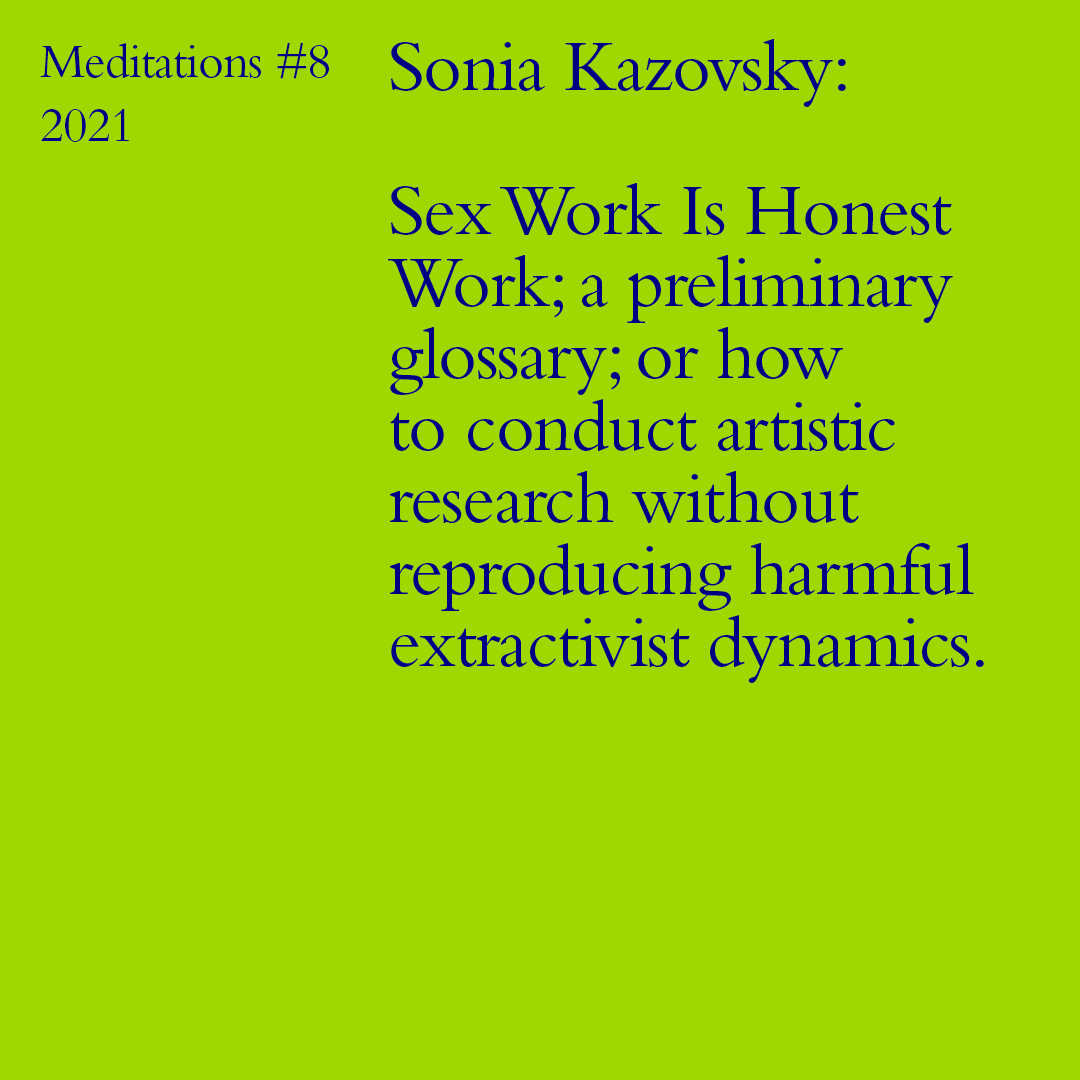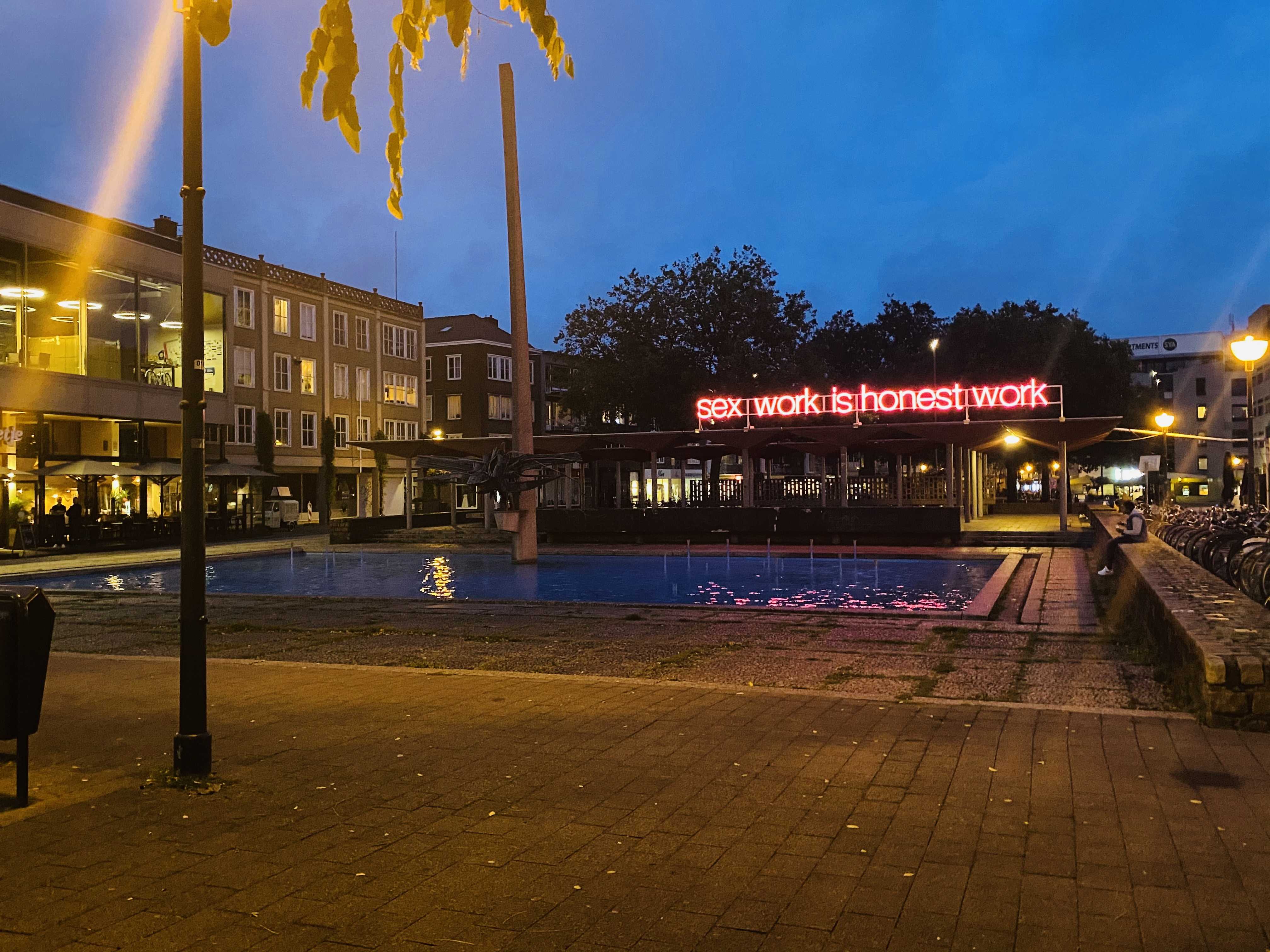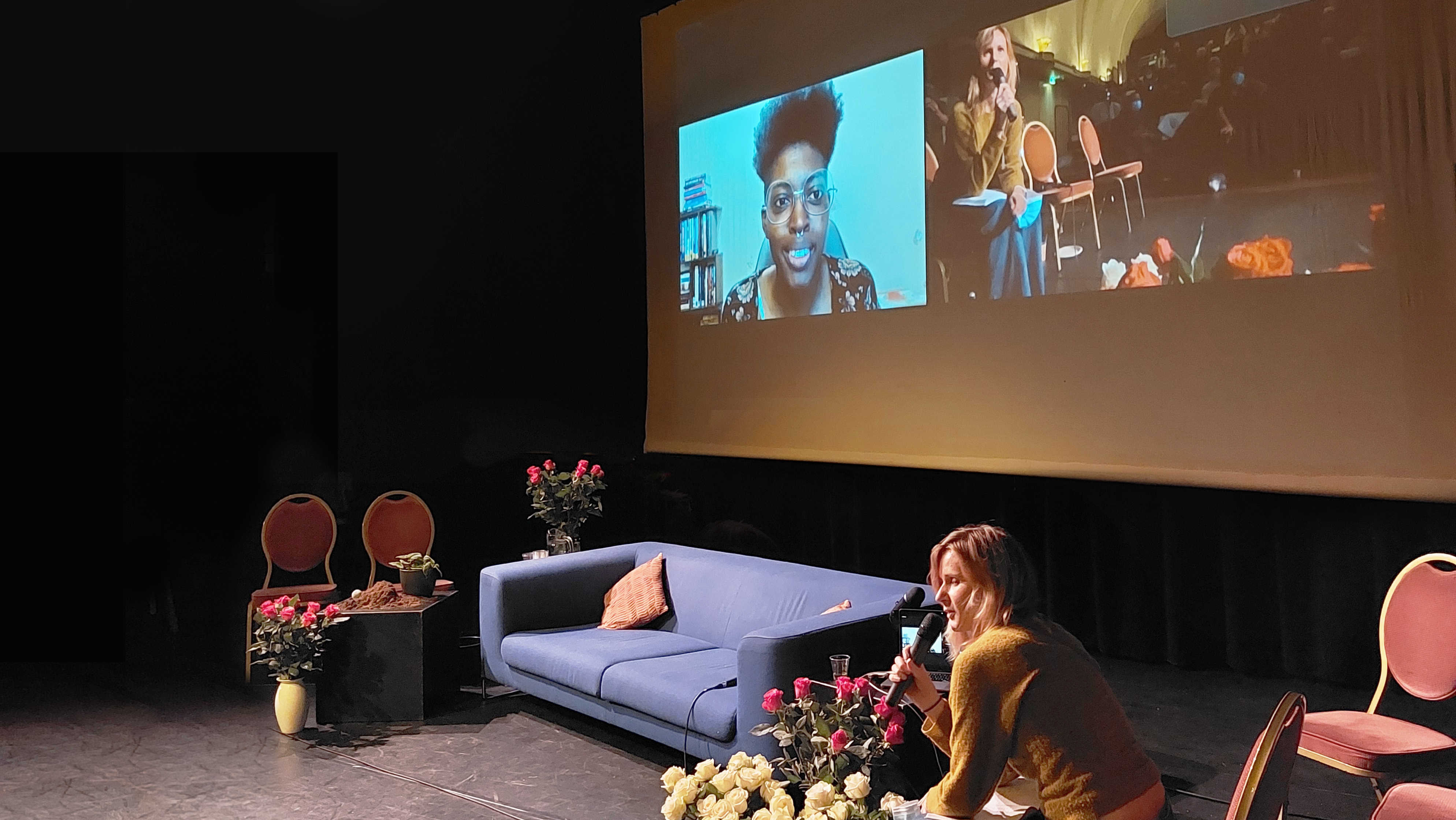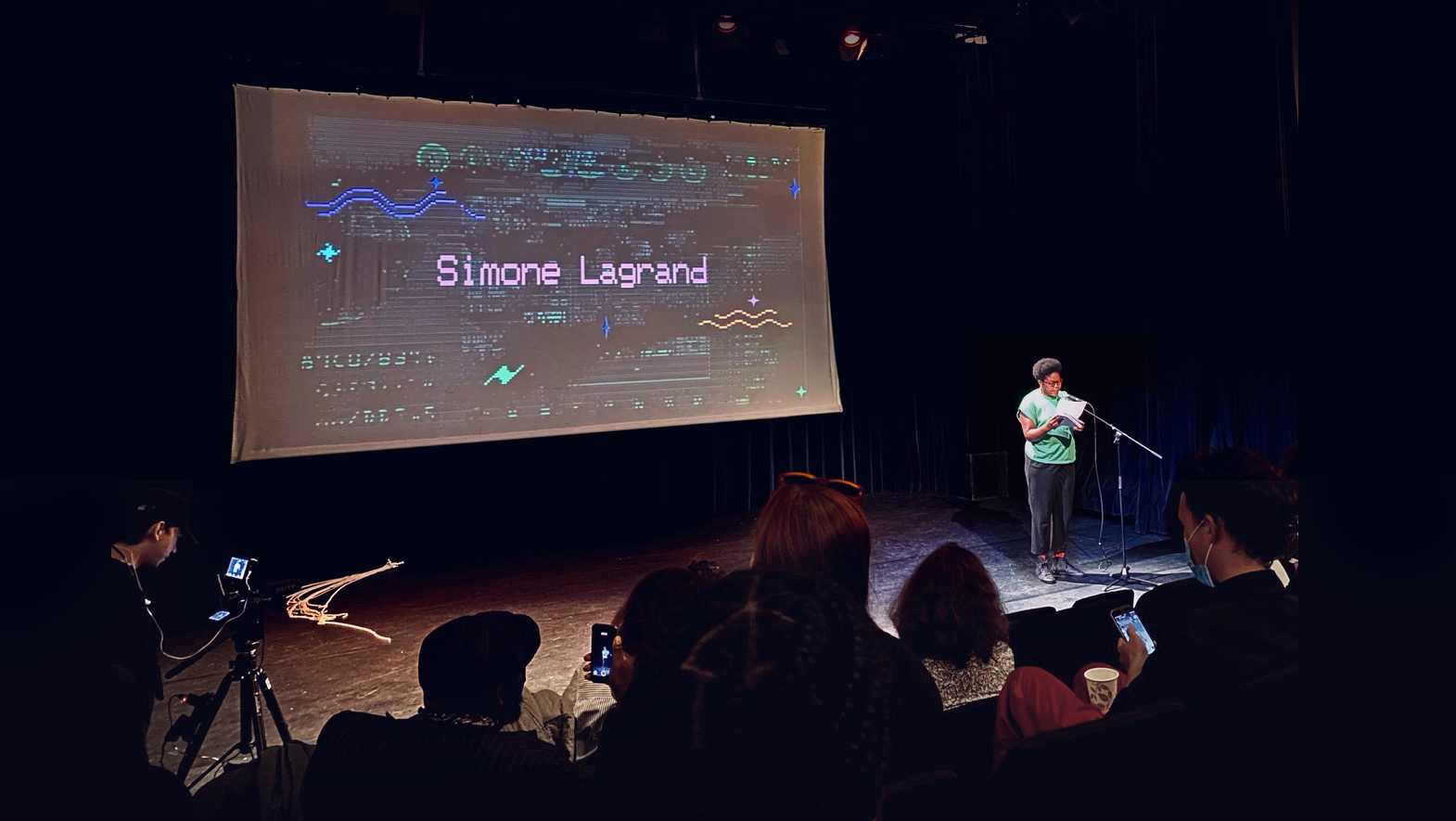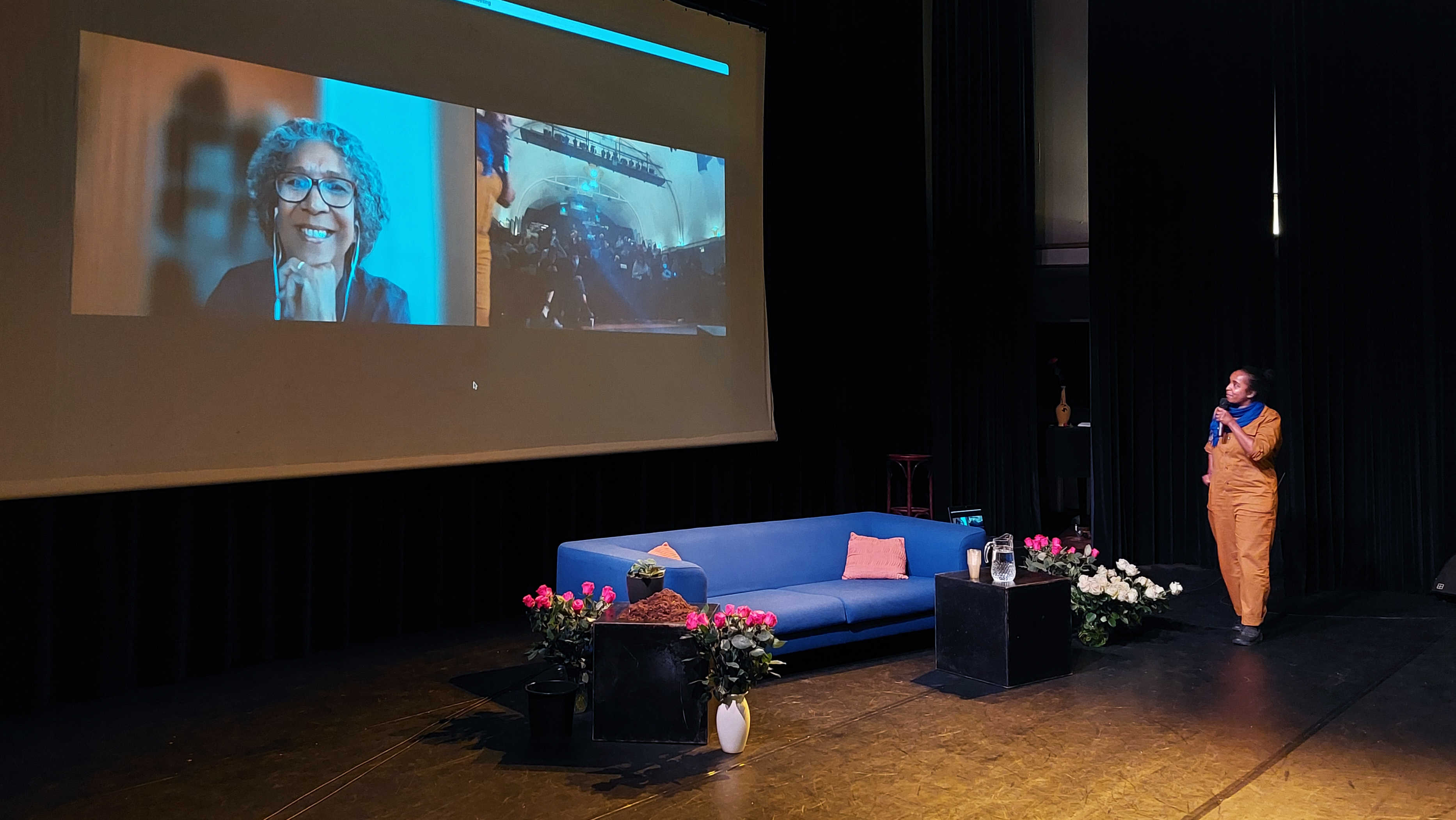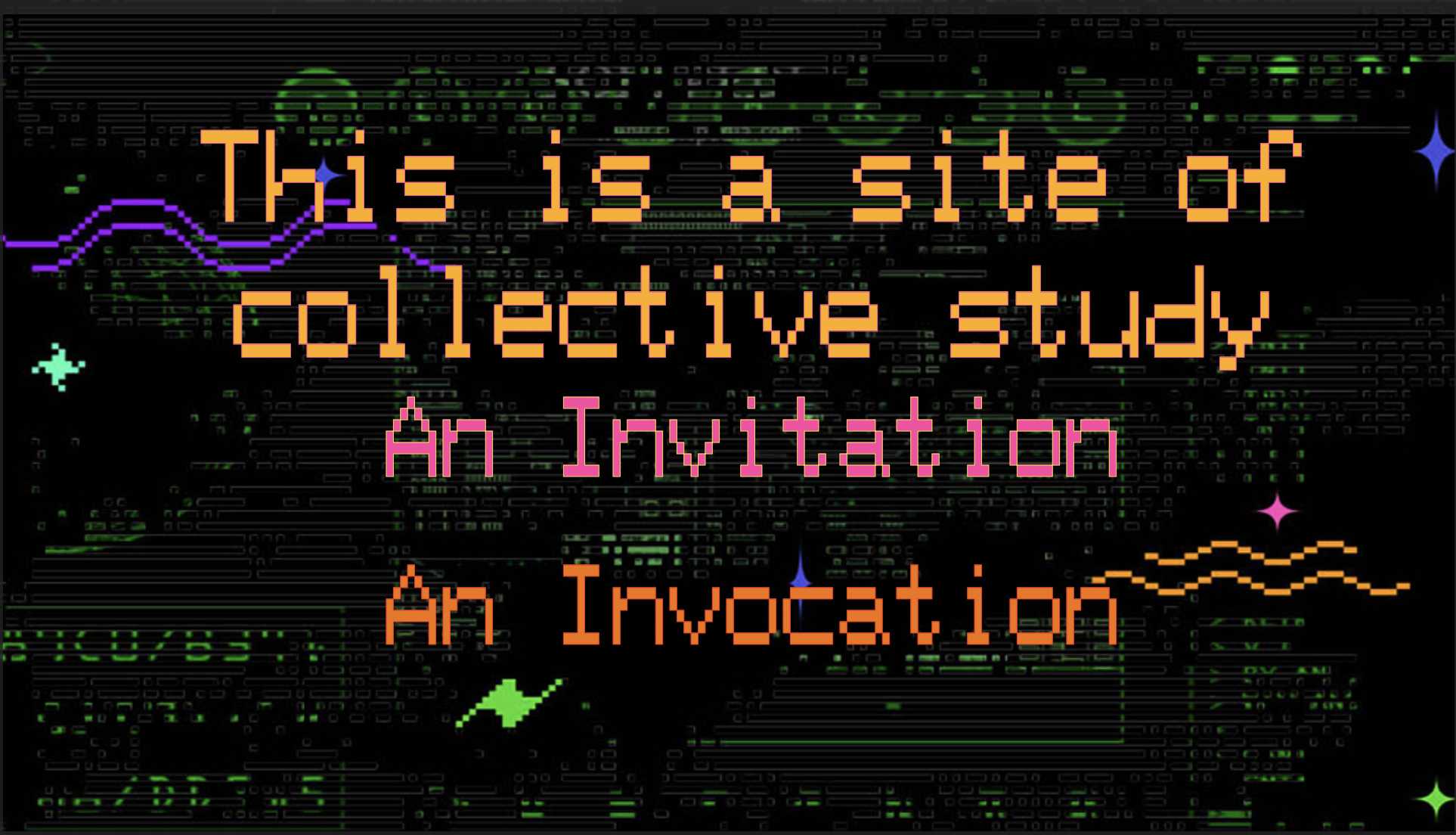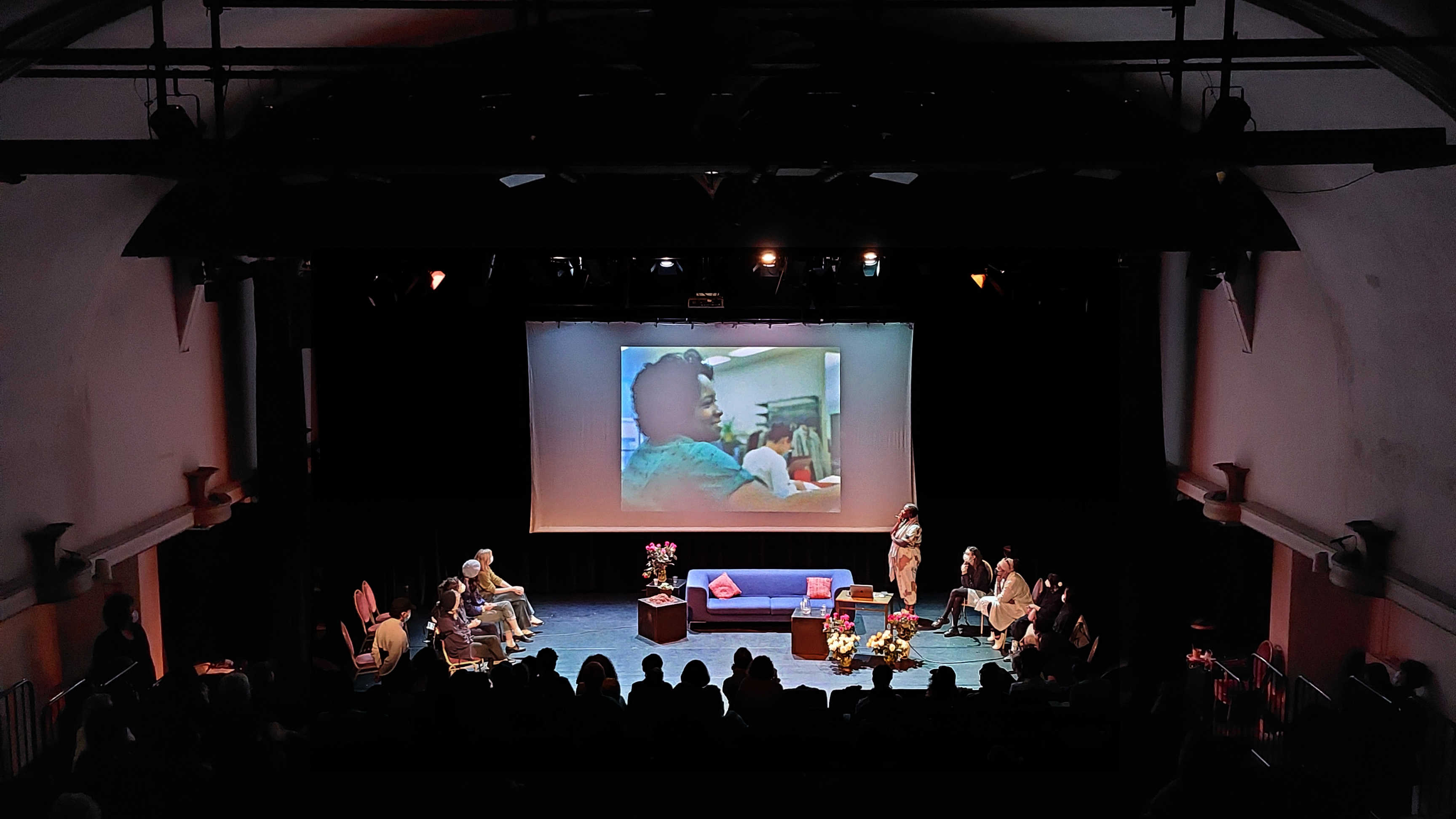2021 ~ Meditations#8 ~ Sonia Kazovsky
Guest appearances by Barby Asante, Dina de Riquet-Bons, Hella Dee, Dipsaus, Ola Hassanain, Kamala Kempadoo, Simone Lagrand, Quirine Lengkeek, Pascale Obolo, Olu Oguibe, Thot Scholar (Moon Moses) & Mavi Veloso. Moderated by Amal Alhaag and Krista Jantowski.
INTRODUCTION
Concluding on the last weekend of August, the first exhibition in the context of sonsbeek20-24 Force Times Distance: On Labour and its Sonic Ecologies could be visited in Arnhem throughout the summer of 2021.
Though much was written on the exhibition itself, its larger framework (time span: 20-24) has ramifications beyond the public moment of the contemporary art exhibition, bringing among other, questions of labor into a local situatedness - rooting them in the site of struggle of sex workers.
sonsbeek20-24 asks what it means to foster methods of being together and how can we show up for each other?
In the context of the two day gathering SEX WORK IS HONEST WORK, the 20-24 question is specified: how could the conversation about legalization of sex work be facilitated and developed? As artistic research and academic inquiry tend to fall into colonial tendencies towards the 'not yet explored' and towards undertheorised subjects, the question posed by the facilitators was; how could this conversation be held not as extraction of value from a material struggle but in support of the actually existing struggle of sex workers, beyond performative alliances?
SEX WORK IS HONEST WORK[1] takes as its activating premise the art work of Olu Olguibe for the Sonsbeek20-24 exhibition: pink and white neon lettering reads SEX WORK IS HONEST WORK and it is installed, both in the city centre of Arnhem and in the Sonsbeek park. In light of Oguibe’s work, the sonsbeek20-24 curatorial team assembled the Council as part of an ongoing collaboration between Sonsbeek20-24 and the Dutch Art Institute (DAI). The latter had already invited the sonsbeek20-24 curatorial team to bring their Council guests to DAI's Roaming Assemblies in Tunis, Radio Kootwijk and so now - to Arnhem, where the two formats (Council & Roaming Assembly) merged, once again.
DAI's dynamic experimentation with radical pedagogy draws on the questions of sonsbeek20-24 to establish a methodology: how to conduct artistic research without reproducing harmful extractivist dynamics?
At the intersection of activism, theory and testimonials of lived experience, a narrative of a fragmented social movement revealed itself during the conversations, performances, poetry, and presentations. All were offered by invited speakers and put in the gentle spotlight, while weaving a field of collegial, versatile, and communal relations, demanding recognition. ‘We want rights, not rescue,’ exclaimed Hella Dee, an activist and a member of PROUD, Dutch union for sex workers.[2]
The necessity of bringing action and discourse together was acutely felt and explicitly mentioned; one of the speakers, Kamala Kampadoo, indicated that the last time a culturally centred gathering occurred, bringing the efforts for recognition of sex work as work, along with its racialised and colonial history, was in 2010.
Commissioned as a report, but with the intention to contribute to this ongoing effort, I propose a preliminary glossary presenting the ideas, entanglements and intersections explored in this first gathering - extending the invitation to partake in this collective study to readers of this text. The various concepts are not presented in their order of appearance, but stay true to the entanglements brought forward during this initial symposium. The choice for the glossary as a format reflects the complex and shifting narratives around sex work, along with its historical and current-day struggle. Many of the concepts are still outstanding from this report but will be added gradually. This preliminary version is presented with the intent to be worked with and further developed.
ART WORK
The work of Olu Oguibe commemorates Nokuphila Kumalo, a young woman who was brutally murdered in Cape Town in 2013. An internationally acclaimed South African artist, Zwelethu Mthethwa, was identified and charged for the murder of Kumalo. Mthethwa was a client of Kumalo’s who provided services as a sex worker. He was only convicted in 2017.
The story of Kumalo highlights that the art world is no exception when it comes to heinous acts of gendered violence.The world is us, not the view from the Eiffel tower. The work of Zwelethu Mthethwa, the murderer of Nokuphila Kumalo, remains, till this very moment, in collections such as MoMA New York, the Scottish National Portrait Gallery, Edinburgh and with sales circulating in the private domain.
WORK
Acknowledging sex work as a legible and decent way of earning money rubs against the edges of social acceptability. Through sex work, the edges of the worlded are exposed - an intersection of (religious patriarchal) morality and law, conceptions of that which is civilized (deriving from colonial categorization of race) and capitalistic logos solidifying the above conceptions through ongoing reproduction.
From a Marxist point of view, the discussion on the legibility of sex as work brings to the fore the question of subsumption under the market’s systemic exploitation, which is at the heart of capital’s accelerated metabolism. The concept of work renders any activity into capitalistic processes of production and reproduction to which one's alienation in relation to the aforementioned activity is imminent. If capitalism solidifies patriarchal and colonial worlding: would the recognition of sex as work strengthen this process? In short: subsumption under capitalism, as we know it in its contemporaneity can look like Amazon, and the thought of what sex work might look like if CEO’d by Bezos is a horrifying prospect.[3]
In actuality, the alienation of sex workers occurs by way of the disacknowledgement of their worker rights, theoretically - work as such - alienates those who labor for money under capitalism from the income generating activity itself. Unionizing and demanding rights on the level of work (as workers), should not explicitly mean subsumption under capitalism but can function as political agency. The very concept of work can be challenged, and has a long history of refusal in anarchist thought. Moon Moses[4] conceptualizes sex work as anti-work, recalling the enslavement of her ancestors who were forced to labor against their will and livelihood. In this way, Moon Moses refuses subsumption under capitalism but utilizes the figure of the worker in her insistence on the equality and rights of the sex workers. Implicit in Moon Moses’s refusal lies a vital possibility, once again pointing to the potentialities of syndical driven policy: in the margins (of subsumption) - can we support other forms of organization, outside of the worlded?
While much can be said about the misconceptions around sex work, the lived reality of sex workers and their unions’ claims is an insistence upon the centrality of a variety of narratives. These narratives cannot be read through moral correction but through their realpolitik.
SEX WORK
The denial of sex work as legible work under capitalism,[5] is at the intersection of gender (patriarchal dualism), race (colonial worlding)[6]and capitalism (institutionalized systems and social organization driven by exploitation for profit.)The prevalent discourses around sex work expose a binary that has hardly changed over centuries and is seldomly unpacked in the contemporary moment.
At best, the dominant contemporary conception of sex work is that of empowerment (enthusiastic consent) or abuse as a pathological response to trauma (institutionalized liberal social work).[7] The first, demands a personal investigation of one's sexuality. The second is, in many instances, an embodiment of patronising saviorism. This binary condemns sex work to the ‘margins’ and can be traced back to the criminalization of sex work in the Middle Ages, when sex workers were sequestered from public life. Since then, sex work carries a stigma, even in contemporary (liberal) politics and strands of feminism.[8]
SPEAKING
Simone Lagrand sings, speaks and chants with penetrating intensity. Martinique French and English languages bring the voice, speech and listening to the fore. Lagrand performed a song originally written by men, a song about women who walk the streets at night. By Simone Lagrand’s amended account, it is not the patriarchal gaze that narrates the story, which she reanimates. Simone Legrand channels the voices of Martinique women by way of her body. These women are burning the streets. Speaking out loud and (at times) unapologetically, is at the core of this gathering.
SITUATEDNESS ~ the Netherlands
The misconception that sex work is legal in the Netherlands is proposed by Quirine Lengkeek, a sociologist and advocate for sex worker’s rights. According to Lengkeek, sex work is frequently misconstrued as legal in the Netherlands. Lengkeek terms the situation as ‘backdoor criminalization’. The legal field of sex work in the Netherlands is murky and difficult to navigate, it is a complex and decentralized licensing system, rendering safe and durable working conditions untenable. The conceptualisation of law and policy, around sex work, Lengkeek says, are produced by dominant narratives that are structurally reproduced. A ban on brothels in the Netherlands was the singular national law from 1911-2000. Despite the lifting of the ban 21 years ago, the Dutch government has not agreed on a national strategy, leaving the work of legislation to the municipalities.
As in many other instances, the pandemic rendered some invisible structures into visible conditions, exposing one way in which backdoor criminalization works: at the beginning of lockdown restrictions, the services provided by sex workers were defined as non-essential. Many other practitioners were forced to cease their income generating activity. While financial relief was provided, with a validation to self employment as a business unit, (and specific category to the precarious cultural field), sex workers received no financial support and their activity was rendered criminalised by way of pandemic restrictions. Outside of pandemic regulations, these difficult working conditions are expressed as instances of limited access to insurance, the difficulty and/or impossibility of renting or buying a house, or even opening a business bank account as a sex worker.[9]
Individuals who generate income by means of erotic capital are forced to navigate the precarious grey areas of the not really legal, yet, partially permitted and in essence - criminalised work. In this way structural marginalization limits people’s mobility. In fact, it is a denial of rights that any other citizen (or legal resident) of, in this case the Netherlands, has.
HUMAN TRAFFICKING
Human trafficking[10] is a coerced explotation of another for (financial) gain. Many conceive of sex work as inherently coerced and most commonly forced. The supposed proximity with human trafficking, points to the inability to know of, or understand a myriad of needs and desires at the base of marginalization and ‘othering’ of sex work. In fact, legal recognition of the (human, residential and citizen) rights of sex workers, raises the question of human trafficking as a (legal, critical, existing) field of its own, at an intersection with but not as synonymous to sex work. Saviorism (a deep felt desire to rescue another-, a self-imposed conception of savior.[11]) and human trafficking seem to go hand in hand. For this reason, accommodating the conversation with actual sex workers, rather than about it is necessary in order to foster different ways of relating and thinking beyond a generalized narrative of coercion.
Lilly spoke under a pseudonym and offline. She will remain anonymous in this account. For Lilly, a highly skilled migrant, who was adopted by Caucasian parents - saviorism and human trafficking are at odds with her choice for sex work, but play an acute role in her adoption. Lilly’s story reveals (yet another) double bind that is commonly ignored - human trafficking is institutionalized by (neo)colonial ties and arrangements, such as transatlantic adoption. Just like sex work, it is rendered marginal, when in actuality it is at the heart of some of the common yet shadowed economies - existing as black markets as well as lucrative industries. Human trafficking can not be considered without accounting for the history of enslaved people. Racialization is at the core of colonial looting and domination over peoples. Further to this, buying and selling human beings is at the core of colonial worlding, shadowed by contemporary imperial infrastructure and borders.
There are many who are trafficked and coerced into sex work against their will, but governmental and local budgeting assigned to sex workers, goes mostly into rehabilitation programs. Rehabilitation programs are either supported by religious or social work organizations, and their activity is undermined by sex worker’s unions as a generic conception of sex workers and their betterment.
Legislation deriving from such a generic betterment conception is imposed as method of policing (to regulate that which is criminalized), and does not provide recognition and/or support for those who are abused or coerced and generalising betterment denies the needs which are articulated by sex workers organizations as their labor rights.
The following needs are advocated by Lengkee and the local sex workers unions:
- Money for organizing and strengthening a community, which provides the possibility for better working conditions, protective unions and the development of collective consciousness that can promote an expanded understanding of sex (work) in and outside of the professional realm.
- Health insurance that considers the vulnerabilities of physical intimate labor.
- Training (expanding the possibilities of professionalized sex work and its possible therapeutic and sexual benefits).
- Accessibility for individual sex workers and cooperatives to open new businesses and participate in the prevalent entrepreneurial economy, that presumably is open for everyone.
It is a common conception that legalization of sex work will institute coercion and abuse, but the demands of the unions ask to protect and strengthen an existing community of sex workers. A community-driven policy can work along potentially harming and potentially empowering dynamics, both present in the field of sex work, creating a dynamic distinction between the two. Such policy could support the development of communal support structures. In many ways, this is a syndicalist proposition - governance is handed to the union of workers. Provided with a law that protects from coercion, a community can attend to those who are oppressed, taken advantage of or have been abused. The current generalized system in place, driven by external conceptions rather than direct engagement with the community, leaves individuals alienated from one another, with little to no support, not from each other nor from the society which makes use of their services. Without distinction between people who choose sex work and people who are the victims of human trafficking or work under some form of coercion, governance is left for shadow markets and individualized policing.
EROTIC CAPITAL
The location of this gathering is the Posttheater, a typical proscenium; we are invited to occupy the stage around Mavi Veloso. The spatial reconsideration of the given hierarchical structure (the assembly form as inherited from symposiums; the spatial theatrical construction of spectatorship) is challenged and refuted on different occasions throughout the gathering. We are evoked by the power of Mavi’s body and voice, transcending any dual understanding of both. Mavi, who holds an MA in sound and voice, identifies as a TRANSdiciplinary artist and challenges singular and dualistic understandings of gender, sex, and sex work (expanding to its wider understanding.)
In an artisanal manipulation of sound and its material potential, the microphones on stage are at the same time a prop, a phallic object and a tool. Mavi plays with the microphone- it is thrown and swirled around the space and Mavi’s body; it's been swallowed, licked, inserted and caressed by electro pop singing. The utility of the microphones is expanded by the possibilities of vocal and sonic output, reenacting highly sexualised forms of presentation and re-presentation, Mavi’s body is exhibited; Mavi is a ‘Darling’ and she will sit on your cock, just dare to ask. Experienced as a reproduction of an image that generates painful criticism of gendered expectations, Mavi’s embodiment transforms the imagination, presenting a different mastery than the one she harnesses. Eroticism produces sound and feedback; eroticism is not binary and not shaded or marginalised. The mastery of Mavi’s technique with sound and its amplification produces an ‘incorrect’ feedback (sound technicians hate me, said Mavi.) Within the space of art, we are somehow more ‘tolerant’ towards the use of erotic capital on stage, offered to the public.
RACIALIZED LABOR ~ sex work as honest and decent work.
Sex work can be understood in terms of emotional, intimate and gendered labor, and in terms of erotic capital and its exchange. It cannot be isolated from its intersection with racialised and colonial worlding.
As a pioneer in her field on the intersection of migration and racialized sexual labor, Kamala Kampadoo weaves a history of black (inter/ cis /male / female / trans) bodies and people whose sexuality and reproductive rights were seized by plantation owners and traffickers, trading humans from Africa, South East Asia and the Americas.
In this history, erotic capital was exchanged for access to better conditions under enslavement. Such an informal economy was also at play in the relations between brown and black women and the colonial perpetrators. Paving a history of sexual labor and its bid for betterment, is also about thinking along worlded relations - unveiling a narrative of transactional and tactical relationships that are not empirically bad, but rather a praxis deeply embedded in social (-economic)relations. This narrative of sexual labor unleashed from moral stigma reveals a long history of enabling and emancipation by sex. Sex and its exchange are an expression and satisfaction of a myriad of wants and desires; the stigma imminent to prostitution is a simplified moralistic judgment.
LIVED EXPERIENCE
At the beginning of the first lockdown Hella Dee and PROUD union, which she is a member of, opened an emergency fund for her colleagues and community.[12] As mentioned previously, the pandemic rendered sex workers as non-essential and their work illegal. Many sex workers survived from client to client and were left without any aid throughout the imposed lockdown rules. The money for the fund was collected from individuals. For Hella Dee, collaborating with local social workers involves money from and agreements with rehabilitation programs. This implies coercion to rehabilitate. Once again, this ignores the needs articulated by a practicing community.
At this gathering, Hella Dee was thinking out loud with us, reflecting on how her life intersects with the city of Arnhem. In this specific assembly, with Oguibe’s SEX WORK IS HONEST WORK as a point of departure, Hella Dee’s thoughts were brought to those who are physically next and with her- in the theatre in Arnhem. One story I will recount here: in 2017 Hella Dee’s colleague Bianca was murdered in Arnhem. Bianca was murdered by her first client providing services as a sex worker. I was a student in Arnhem in 2017, I didn’t know about that when it happened.
SPATIAL IS PUBLIC
From the perspective of sex workers, public space and the streets are also part of the map unfolding the worlded. From Paris (Pascale Obolo) to Khartoum (Ola Hassanain), the streets are at once a site of possibility and survival. From the perspective of sex workers the city is a constant navigation through architectures of governance - a site where movement is regulated by choreographies of policing. Contemporary processes of gentrification also play a role in spatial marginalization. Presented as modes of social progression, they are in fact progressive financial politics without consideration for displaced, most commonly vulnerable communities.
Publicness was thought through by the curatorial team throughout the programming of the two day symposium.The Radio, DAI’s physically present community and online streaming, facilitated the conversations on different platforms, but also accounted for care towards the speakers: from going off-line, to expanding the scope of contributions through Sonsbeeks20-24's parasite radio. On the second day of the gathering Dipsaus[13] hosted an episode of parasite radio's podcast, for the occasion on stage, with the participation of Dinah de Riquet-Bons, Barby Asante, Hella Dee and sonsbeek20-24 curator Amal Alhaag as a co-host.
WEAVING TOGETHER
The form of a symposium (council / assembly) implies a specific knowledge economy in which students, artists and academics adhere to an expected performance of knowledge, expertise and its supposed authority. The framework of a collective study allows and even encourages not knowing (both in the theoretical sense, as well as not knowing as lived experience) as a viable position. The Weaver Collective, a temporary collective of DAI students,[14] was formed as a preparatory study group. Aesthetically, it attempts to weave together the students, the people invited to speak and those who they were invited to speak with. Practically, it becomes a way to consider the possible difficulty of relating to sex work as honest work- and instead of presenting an expert solution, takes a first step as an inquiry.
This inception reflects 20-24’s intent to embed itself in relationships. Harnessing the partnership with DAI as an institutional and pedagogical (ongoing) framework, becomes a method for being/becoming public, digressing from prescribed moments of visibility. The potential of such an initiative lies in supporting the process of cultivation around sex as work. The means of engagement experimented with throughout the gathering was strengthened by the already existing community of the DAI. The students, the resources and infrastructure of the DAI, are the carved space and time in the publicness of art. The public nature of art that materializes in presentation and moments of visibility is converted, through the educational framework of the DAI, into a pedagogical process of learning together with the struggle of sex workers rather than about. The process of cultivation is a protest against the exclusion from publicness experienced by those who choose sex work. Art’s centrality (in relation to the margins) can be a platform for a broader public and social life that might support and promote deviant methods of social organization, as well as progressive policy making.
By extending the partnerships and commitment throughout sonsbeek 20-24, the curatorial team proposes to transform the quadrennial form from a one-off exhibition to a framework supporting a process of publicness. With that perspective in mind, we enter the conversation around sex work as honest work, with the intention of becoming a friend (as opposed to ‘being an ally’). [15] Perhaps in friendship one can show-up without fully understanding. Being a friend, it feels urgent to have different politics around sex work. And as friendship asks for continuity, the next step could potentially be a community based study group strengthened by thinkers, activists and artists in support of local and international sex workers unions with the intent is to move towards becoming in relation. By creating structural conditions that are durable, it is possible to develop relationships that exist beyond the public temporality of art exhibitions.
We are finishing the two day gathering with the vital reimagination of archival material through the prism of care and labor. For the artist Barby Asante, a collective process challenges, reimagines and transforms a narrative. Her ongoing work is archival, curatorial, performative - all these are categories to describe the different cross and trans disciplinary ways in which Barby Asante and her community cultivate the site of their struggle.
My hope is that initiating this glossary might become of use in the efforts to acknowledge SEX WORK as HONEST WORK.
Text by Sonia Kazovsky
(with gratitude to Samantha McCulloch for proofreading)
NOTES:
[1] https://www.sonsbeek20-24.org/en/artist-list/olu-oguibe/
[2] https://www.wijzijnproud.nl/
[3] There is no need to be subsumed by Bezos, as there are many shadowed and black economies on the ‘margins’ of capitalism that in their marginality are in fact subsumed by unregulated markets.
[5] Silvia Federici expands on the subject of sex as a service, as socially accepted in medieval times, while its restriction and criminalization came with developments of capitalism and were unpacked in the analysis of primitive accumulation, criminalization of sex work, so described by Federici, is part of a fuse between state and church designed to restrict the reproductive rights of women as it was a newly rendered productive asset.
[6] I use the term worlding in the genealogy of Gayatri Spivak. The term connotes invisible infrastructures and modes of categorization that design a coerced lived reality, Spivak’s work around the concept of worlding concerns processes of translation. Spivak identifies the way in which translation coerced on colonial subjects, rendering native lived reality to Eurocentric terminology, and therefore logic.
[7] Echoing the sentiments expressed during these two days and my own limited research, in which the tools for analysis in social work are centered around the different strands of social psychology, centre specific research over another. This is in no way intended as rendering social work obsolete, but rather points to the specific tendency that was considered during these two days.
[8] Liberal feminism and its intellectual white ancestry is a subject in itself to be unpacked but is not considered fully in this account due to the limits of this format.
[9] Even the socially conscious Tridos bank responds to sex workers attempts to open business bank accounts as beyond their ethical conceptions.
[10] The legal definition of human trafficking varies per country. The European commission recommendation for legal framework (2011): https://ec.europa.eu/anti-trafficking/sites/default/files/directive_thb_l_101_15_april_2011_1.pdf
[11] Tied historically to different colonial desires among which isreligious missionarism as well as other historical and contemporary instantiations.
[12] Dutch emergency fund for sex workers https://www.dutchemergencyfund.nl/
[14] Weaver collective students: lgın Deniz Akseloğlu, Cristina Emmel, Derek Di Fabio, Elisa Giuliano, Hannah Jones, Ioana Lupascu, Vera Mühlebach, Emmeli Person, Liza Rinkema Rapuš, Lou Lou Sainsbury, Iga Świeściak and Marie Tučková́.

